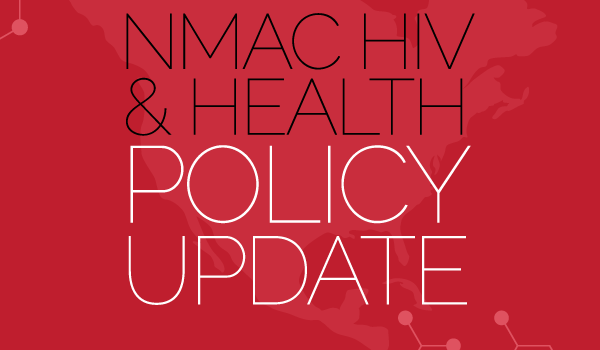


Important Happenings in HIV/Health Policy
Week ending: April 5, 2019 By: Sable K. Nelson Gilead Submits Supplemental New Drug Application to U.S. Food and Drug Administration for Once-Daily Descovy for HIV Pre-Exposure Prophylaxis On April […]

Important Happenings in HIV/Health Policy
Important Happenings in HIV/Health Policy Week ending: March 29, 2019 By: Gina Bae & Sable K. Nelson CDC: 40% of People Living with HIV Cause 80% of New Transmissions Shortfalls […]
NMAC’s Pillars to End the Epidemic
 What will it take to end the HIV epidemic in your jurisdiction? Now is the time to gather your strategy. The initiative’s work starts with community planning councils (not their real name, the final name has yet to be determined). Their job is to put together the local plan. Sometime in FY 2020, funds will hopefully be granted to implement the priority components of the local plans. With ongoing data collection and shared evaluation tools, successful programs can be identified and replicated.
What will it take to end the HIV epidemic in your jurisdiction? Now is the time to gather your strategy. The initiative’s work starts with community planning councils (not their real name, the final name has yet to be determined). Their job is to put together the local plan. Sometime in FY 2020, funds will hopefully be granted to implement the priority components of the local plans. With ongoing data collection and shared evaluation tools, successful programs can be identified and replicated.
Our planning is missing scientifically approved interventions that successfully keep people living with HIV (PLWH) and people on PrEP in healthcare and on meds. NMAC believes this information is key to our ability to end the HIV epidemic. While health centers are a great place to get healthcare, they don’t have the retention services this initiative requires to be successful. Retention and adherence efforts should be done through community-based organizations with a proven track record of reaching the priority populations. All the interventions should be led and staffed by the people the intervention hopes to reach. These efforts must work closely with their Center for AIDS Research (CFAR) to document the implementation science needed for more funding.
 NMAC believes there are three key pillars for community to prioritize:
NMAC believes there are three key pillars for community to prioritize:
- Community Planning Councils
- Program Implementation
- Evaluation
Community Planning Councils
 Soon $30 million in new planning money will go to 58 jurisdictions to build plans to end the HIV epidemic in their city, county, or state. Local planning groups should reflect the local HIV epidemic. Now is the time to identify leaders to add to existing or new planning councils, particularly leaders from the communities with the greatest need. While many jurisdictions have comprehensive plans, they tend to be limited to resource rich regions. There are many jurisdictions that need support and should be prioritized for training and technical assistance.
Soon $30 million in new planning money will go to 58 jurisdictions to build plans to end the HIV epidemic in their city, county, or state. Local planning groups should reflect the local HIV epidemic. Now is the time to identify leaders to add to existing or new planning councils, particularly leaders from the communities with the greatest need. While many jurisdictions have comprehensive plans, they tend to be limited to resource rich regions. There are many jurisdictions that need support and should be prioritized for training and technical assistance.
NMAC believes local planning councils should lead with race and:
- reflect the demographics of the local epidemic
- prioritize people living with HIV
- use transparent decision-making process
- have transparent distribution of resources
- be data driven
- understand that data for the transgender community is often incomplete
- receive training and technical assistance on biomedical HIV prevention, use of data, retention in healthcare, evaluation and other topics of value
- offer specialized training that supports underrepresented communities to sit at the table
- develop web portals that use technology for transparency and to manage the planning councils
Program Implementation
 Plans to end the epidemic should prioritize interventions that successfully retain PLWH and people on PrEP in healthcare and adherent to meds. There is a long-term behavioral component to this biomedical solution, particularly for PLWH who have fallen out of care. It has been well documented that too many people over 50 living with HIV suffer from stigma, isolation, and depression. Programs must incorporate trauma-informed care to reach those most vulnerable and address the mental health challenges that impact too many living with HIV.
Plans to end the epidemic should prioritize interventions that successfully retain PLWH and people on PrEP in healthcare and adherent to meds. There is a long-term behavioral component to this biomedical solution, particularly for PLWH who have fallen out of care. It has been well documented that too many people over 50 living with HIV suffer from stigma, isolation, and depression. Programs must incorporate trauma-informed care to reach those most vulnerable and address the mental health challenges that impact too many living with HIV.
NMAC believes planning councils should prioritize:
- biomedical solutions (PrEP & U=U)
- HIV wrap around services that allow biomedical solutions to work
- STD and hepatitis testing to identify people who could benefit from PrEP
- funds for community organizing of at risk populations to boost outreach efforts
- funding for community-based organizations
- transparent grant making
- program led and staffed by the communities the initiative hopes to reach
- mental health services that are key to reaching the most vulnerable
Evaluation
 The planning councils and the programs being implemented need clear evaluation tools in advance of implementation. The tools should help both the councils and the providers better understand the success and challenges of the planning process and the programs being implemented. Transparency of data is critical to successful replication.
The planning councils and the programs being implemented need clear evaluation tools in advance of implementation. The tools should help both the councils and the providers better understand the success and challenges of the planning process and the programs being implemented. Transparency of data is critical to successful replication.
NMAC believes evaluation should be based on:
- real numbers, i.e., the number of PLWH who are retained in care and their viral load and the number of people who have stayed on PrEP for longer than 12 months
- national criteria/standards so that initiatives can compared across jurisdictions
- inclusion of CFARs, which should be brought into the process from the beginning
- annual in-person updates for the community on the success or challenges of the initiative
- data that are placed online for everyone to access
Reaching the 400,000 PLWH and 975,000 more people on PrEP requires strong linkages to the target communities. Community organizing is key. Efforts from the government can be viewed with suspicion. Now is the time to support networks of people living with HIV and people on PrEP. Government solutions need the buy-in and trust from the communities they hope to reach. Too many previous attempts were highly proscribed. It is time to shift the HIV paradigm to prioritize 400,000 PLWH and 975,000 more people on PrEP.
Yours in the struggle,
Paul Kawata

Important Happenings in HIV/Health Policy
Important Happenings in HIV/Health Policy Week ending: March 15, 2019 By: Sable K. Nelson Trump Administration Releases its FY20 Budget Request Trump Administration Releases its FY20 Budget Request On March […]
Important Happenings in HIV/Health Policy
Important Happenings in HIV/Health Policy Week ending: March 8, 2019 By: Sable K. Nelson & Matthew Rose NOTE: President Trump released his FY20 budget request to Congress, including top-line funding […]
Important Happenings in HIV/Health Policy
Important Happenings in HIV/Health Policy Week ending: March 1, 2019 By: Sable K. Nelson & Matthew Rose Drug-Company Patents vs. the Public Good: Should the NIH Break This Medication Patent? […]
Important Happenings in HIV/Health Policy
Important Happenings in HIV/Health Policy Week ending: February 22, 2018 By: Sable K. Nelson & Matthew Rose JAIDS: Clinical outcomes of young black men receiving HIV medical care in the […]
Important Happenings in HIV/Health Policy
Important Happenings in HIV/Health Policy
Week ending: February 15, 2018
By: Sable K. Nelson & Matthew Rose
Elizabeth Warren’s ambitious plan to fight the opioid epidemic, explained
Elizabeth Warren (with Rep. Elijah Cummings) introduced the Comprehensive Addiction Resources Emergency (CARE) Act in 2018 which would authorize $100 billion over 10 years to address drug addiction by boosting addiction treatment and other policy initiatives to reduce overdose deaths. This bill is being compared to the model of the Ryan White Program which greatly minimized the HIV/AIDS epidemic in the 1990s. The CARE Act has not moved far in the Congress yet but it hopes to go through some more edits as it still exemplifies a great start to addressing the issue. For more information, READ → https://www.vox.com/future-perfect/2019/2/19/18214179/elizabeth-warren-opioid-epidemic-president-trump
Federal Judge Temporarily Blocks Military from Forcing Out HIV-Positive Airmen
Citing a lack of evidence that HIV should prevent them from serving, a federal judge ordered the Department of Defense to halt the pending discharge proceedings against two HIV-positive members of the U.S. Air Force. Last year, two airmen living with HIV sued after they were discharged because of their condition. They provided medical evidence to show that they were asymptomatic and physically fit to deploy. The federal judge’s ruling allows the two airmen who sued to remain in their posts pending trial. Without intervention, both would have been terminated in the next few weeks. For more information, READ → https://www.washingtonpost.com/local/public-safety/federal-judge-temporarily-blocks-military-from-forcing-out-hiv-positive-airmen/2019/02/15/5e40b1a2-313c-11e9-813a-0ab2f17e305b_story.html?noredirect=on&utm_term=.86b3068aac4a
HHS Requests Community Feedback on National HIV/AIDS Strategy (NHAS) and the National Viral Hepatitis Action Plan (NVHAP)
Both the National HIV/AIDS Strategy (NHAS) and the National Viral Hepatitis Action Plan (NVHAP) expire in 2020. The Department of Health and Human Services (HHS) Office of HIV/AIDS and Infectious Disease Policy (OHAIDP), in collaboration with federal partners, is leading development of the next iterations of these two separate and distinct national strategies. To help inform the next iterations of the NHAS and NVHAP, HHS seeks input from external stakeholders for improving efficiency, effectiveness, coordination, and accountability of HIV and viral hepatitis prevention, care, treatment, and cure policies, services, and programs.
SAVE THE DATE for the In-Person Listening Session on Friday, February 22, 2019: In-person Listening Session at HHS from 11:00 a.m.–1:00 p.m. (ET) in Room 800 of the Hubert H. Humphrey Building, 200 Independence Avenue, SW, Washington, DC, 20201. RSVP by Thursday, February 14 by sending your name, title, and organization to HepHIVStrategies@hhs.gov.
SHARE YOUR COMMENTS IN WRITING no later than 5:00 p.m. ET on March 11, 2019: In addition, we will soon publish a Request for Information (RFI) in the Federal Register to solicit written comments, recommendations, and ideas for updating both the NHAS and the NVHAP. As soon as the RFI is published, NMAC will provide a link to it as well as information about its deadline for input.
Electronic responses are strongly preferred and may be addressed to HepHIVStrategies@hhs.gov.
Hardcopy written responses should be addressed to:
U.S. Department of Health and Human Services
Room L001
330 C Street SW
Washington, DC 20024
Attention HIV/Viral Hepatitis RFI
All the input gathered from the listening sessions and responses to the RFI will be shared with our federal partners, who collectively will use that information to update the vision, goals, and strategies for both plans, as well as each agency’s actions for implementing them.
For more information, READ https://www.federalregister.gov/documents/2019/02/08/2019-01695/request-for-information-rfi-improving-efficiency-effectiveness-coordination-and-accountability-of
NIH Seeks Feedback from interested stakeholders on a review of the NIH HIV/AIDS Research Priorities and Guidelines for Determining AIDS Funding
The Office of AIDS Research (OAR) in the Division of Program Coordination, Planning, and Strategic Initiatives (DPCPSI), Office of the Director (OD), National Institutes of Health (NIH) invites feedback from interested stakeholders on a review of the NIH HIV/AIDS Research Priorities and Guidelines for Determining AIDS Funding (NOT-OD-15-137) now entering year four of implementation. To ensure consideration, responses must be submitted by: April 13, 2019 11:59:59 PM EDT. For more information, READ https://www.federalregister.gov/documents/2019/02/08/2019-01695/request-for-information-rfi-improving-efficiency-effectiveness-coordination-and-accountability-of
Podcast: KHN’s ‘What The Health?’ “Medicare-For-All” For Dummies
The “Medicare–for-all” debate is already in full swing, but what does that phrase even mean? Joanne Kenen of Politico, Paige Winfield Cunningham of The Washington Post and Rebecca Adams of CQ Roll Call join KHN’s Julie Rovner for a beginner’s guide to the next big health policy debate. For “extra credit,” the panelists provide their favorite health policy stories of the week, and as a special Valentine’s Day bonus, their favorite #HealthPolicyValentines. For more information, LISTEN → https://khn.org/news/podcast-khns-what-the-health-medicare-for-all-for-dummies/
The Real Reasons Women of Color Lack Access to Health Care
The most prominent factors influencing why women of color are more severely affected with certain health issues is due to the lack of access to and understanding of health care resources. There are biases embedded in physicians and the health care system itself that directly affect care quality (according to Dr. Nesochi Okeke-Igbokwe). The lack of information and resources is prevalent among women of color who need mental health. They have limited access to mental health resources and find little merit in seeking professional help. Due to their deep desire to seem strong, they perceive their struggles as a sign of weakness and wait too long before seeing a doctor. In dealing with these factors, women of color need to be empowered and educated about their options.For more information, READ → https://www.sheknows.com/health-and-wellness/articles/2002411/women-of-color-health-care/
What You Can Do
TAKE ACTION: It is very important that our elected officials hear from us to protect federal funding for HIV prevention and care. Speak truth to power by sharing your personal stories with your elected officials. It is vitally important to meet to your federal elected officials when they are at home. If we don’t support and advocate for HIV funding and programs, who will? Our movement cannot afford to stand on the sidelines. Your U.S. Senators and U.S. Representatives need to hear from you.
- Find your U.S. Senators: https://www.senate.gov/general/contact_information/senators_cfm.cfm
- Find your U.S. Representative: https://www.house.gov/representatives/find-your-representative
What NMAC is Doing About It
- NMAC remains vigilant in its advocacy to protect FY20 government funding and the existence of the social safety net. And we will start looking for increases to our existing programs.
- NMAC is planning for the new year and meeting our new members of Congress. We are very excited to talk to the new House about our priorities.
- NMAC is working in coalition to defend the right of people living with HIV to serve in the US military.
Important Happenings in HIV/Health Policy
Important Happenings in HIV/Health Policy
Week ending: January 25, 2018
By: Sable K. Nelson & Matthew Rose
HHS Requests Community Feedback on National HIV/AIDS Strategy (NHAS) and the National Viral Hepatitis Action Plan (NVHAP)
The U.S. Department of Health & Human Services Office of HIV/AIDS and Infectious Disease Policy (OHAIDP) will soon host two listening sessions to continue gathering public input for updates to the National HIV/AIDS Strategy (NHAS) and the National Viral Hepatitis Action Plan (NVHAP). Both national plans currently expire in 2020.
Save the Dates for the In-Person Listening Session on Friday, February 22, 2019: In-person Listening Session at HHS from 11:00 a.m.–1:00 p.m. (ET) in Room 800 of the Hubert H. Humphrey Building, 200 Independence Avenue, SW, Washington, DC, 20201. RSVP by Thursday, February 14 by sending your name, title, and organization to HepHIVStrategies@hhs.gov.
Share Your Comments in Writing
In addition, we will soon publish a Request for Information (RFI) in the Federal Register to solicit written comments, recommendations, and ideas for updating both the NHAS and the NVHAP. As soon as the RFI is published, NMAC will provide a link to it as well as information about its deadline for input.
All the input gathered from the listening sessions and responses to the RFI will be shared with our federal partners, who collectively will use that information to update the vision, goals, and strategies for both plans, as well as each agency’s actions for implementing them.
Modeling Study Shows Two Common STDs Threaten Advances in HIV
Despite tremendous advancements that have been made toward the goal of ending the HIV epidemic in the US, a modeling study recently published in Sexually Transmitted Diseases, Researchers reported that 10 percent of all new HIV cases among men-who-have-sex-with-men in the US are caused by gonorrhea and chlamydia infections. Gonorrhea and chlamydia are the two most common reportable infections in the US. This model supports research showing these STDs increase the body’s risk to transmit and receive HIV. The increase of gonorrhea and chlamydia threatens the decrease of over 13 percent in new HIV cases over the last eight years – as the result of sustained federal investment in HIV prevention and the advent of biomedical advances like PrEP. For more information, READ → http://www.ncsddc.org/wp-content/uploads/2019/01/2019_Jones_Proportion_of_Incident_HIV_Cases_among_Men_Who.98127.pdf
Drug-Pricing Policies Find New Momentum As ‘A 2020 Thing’
Emboldened by midterm election results and interest in possible presidential runs, Democrats are advancing a slew of new and old legislative proposals. It’s not yet clear, though, which if any could go the distance. For more information, LISTEN → https://khn.org/news/drug-pricing-policies-find-new-momentum-as-a-2020-thing/
Podcast: KHN’s ‘What The Health?’ ‘Medicare-For-All’? More? Some?
“Medicare-for-all” has become the rallying cry for Democrats in the new Congress. But there is a long list of other ways to increase insurance coverage. Meanwhile, the Trump administration continues to chip away at the Medicaid program for the poor, and new rules could mean higher costs for individual health insurance in 2020. Alice Ollstein of Politico, Stephanie Armour of The Wall Street Journal and Paige Winfield Cunningham of The Washington Post join KHN’s Julie Rovner to discuss these issues and, for “extra credit,” provide their favorite health policy stories of the week. For more information, LISTEN → https://khn.org/news/podcast-khns-what-the-health-medicare-for-all-more-some/
What You Can Do
TAKE ACTION: It is very important that our elected officials hear from us to protect federal funding for HIV prevention and care. Speak truth to power by sharing your personal stories with your elected officials. It is vitally important to meet to your federal elected officials when they are at home. If we don’t support and advocate for HIV funding and programs, who will? Our movement cannot afford to stand on the sidelines. Your U.S. Senators and U.S. Representatives need to hear from you.
- Find your U.S. Senators: https://www.senate.gov/general/contact_information/senators_cfm.cfm
- Find your U.S. Representative: https://www.house.gov/representatives/find-your-representative
What NMAC is Doing About It
- NMAC remains vigilant in its advocacy to protect FY20 government funding and the existence of the social safety net. And we will start looking for increases to our existing programs.
- NMAC is planning for the new year and meeting our new members of Congress. We are very excited to talk to the new House about our priorities.
- NMAC is working in coalition to defend the right of people living with HIV to serve in the US military.

